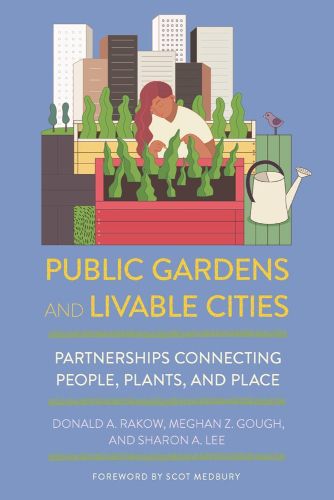Readings Newsletter
Become a Readings Member to make your shopping experience even easier.
Sign in or sign up for free!
You’re not far away from qualifying for FREE standard shipping within Australia
You’ve qualified for FREE standard shipping within Australia
The cart is loading…






Public Gardens and Livable Cities changes the paradigm for how we conceive of the role of urban public gardens. Donald A. Rakow, Meghan Z. Gough, and Sharon A. Lee advocate for public gardens as community outreach agents that can, and should, partner with local organizations to support positive local agendas.
Safe neighborhoods, quality science education, access to fresh and healthy foods, substantial training opportunities, and environmental health are the key initiative areas the authors explore as they highlight model successes and instructive failures that can guide future practices. Public Gardens and Livable Cities uses a prescriptive approach to synthesize a range of public, private, and nonprofit initiatives from municipalities throughout the country. In doing so, the authors examine the initiatives from a practical perspective to identify how they were implemented, their sustainability, the obstacles they encountered, the impact of the initiatives on their populations, and how they dealt with the communities’ underlying social problems.
By emphasizing the knowledge and skills that public gardens can bring to partnerships seeking to improve the quality of life in cities, this book offers a deeper understanding of the urban public garden as a key resource for sustainable community development.
$9.00 standard shipping within Australia
FREE standard shipping within Australia for orders over $100.00
Express & International shipping calculated at checkout
Public Gardens and Livable Cities changes the paradigm for how we conceive of the role of urban public gardens. Donald A. Rakow, Meghan Z. Gough, and Sharon A. Lee advocate for public gardens as community outreach agents that can, and should, partner with local organizations to support positive local agendas.
Safe neighborhoods, quality science education, access to fresh and healthy foods, substantial training opportunities, and environmental health are the key initiative areas the authors explore as they highlight model successes and instructive failures that can guide future practices. Public Gardens and Livable Cities uses a prescriptive approach to synthesize a range of public, private, and nonprofit initiatives from municipalities throughout the country. In doing so, the authors examine the initiatives from a practical perspective to identify how they were implemented, their sustainability, the obstacles they encountered, the impact of the initiatives on their populations, and how they dealt with the communities’ underlying social problems.
By emphasizing the knowledge and skills that public gardens can bring to partnerships seeking to improve the quality of life in cities, this book offers a deeper understanding of the urban public garden as a key resource for sustainable community development.